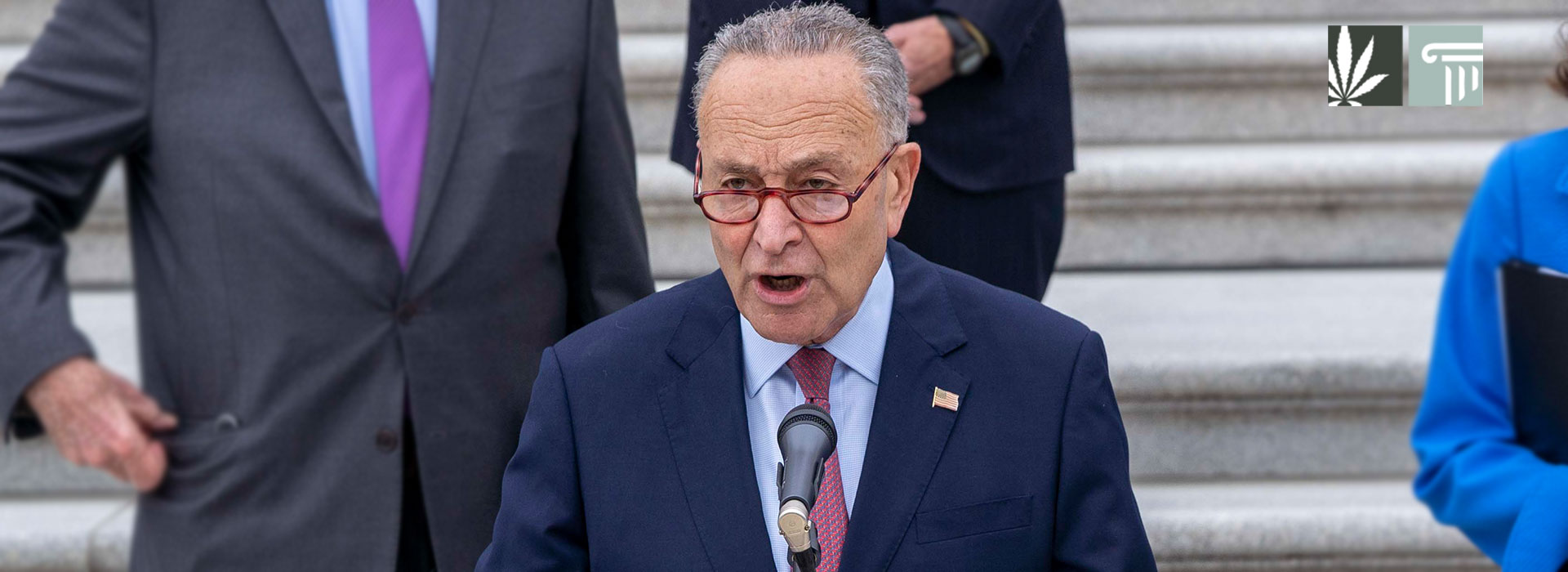Top Senate lawmakers have finally unveiled the first draft of a bill to federally legalize cannabis, with a call for public input on the legislation before it’s finalized and put to a congressional vote.
Senate Majority Leader Chuck Schumer (D-NY), Sen. Cory Booker (D-NJ) and Senate Finance Committee Chairman Ron Wyden (D-OR) presented the 163 page bill – the Cannabis Administration and Opportunity Act – at a press conference as a comprehensive proposal to scale back the federal government’s war on drugs and instead prioritize criminal justice reform, restorative justice and public health, while offering much needed tax income.
It's past time to bring our nation's outdated, racist cannabis laws into the 21st century and ensure equal justice for Americans hurt by the failed war on drugs. Our legislation will do just that.
— Ron Wyden (@RonWyden) July 14, 2021
“Cannabis prohibition, a key pillar of the failed war on drugs, has caused substantial harm to our communities and small businesses, and especially for communities of color,” Wyden said. “It’s as simple as this: Senators Booker, Schumer and I want to bring common sense to the federal government, end prohibition and restore the lives of those hurt most and set them up for opportunity.”
Wyden’s comments were echoed by Sen. Booker who said marijuana criminalization “has unfairly impacted low-income communities and communities of color” for decades.
A marijuana conviction can mean a lifetime of unjust hardship—trouble getting a job, housing, loans & more in addition to thousands of other collateral consequences. It’s time to legalize marijuana, expunge records & restore justice to communities harmed by the failed drug war. https://t.co/2hexx56LM6
— Sen. Cory Booker (@SenBooker) July 14, 2021
“While red and blue states across the country continue to legalize marijuana, the federal government continues to lag woefully behind,” he said. “It is time for Congress to end the federal marijuana prohibition and reinvest in communities most impacted by the failed War on Drugs.”
The details of the proposal are broadly in line with what marijuana reform advocates had expected. The bill would deschedule marijuana federally, expunge prior low-level cannabis convictions, allow those serving time in federal prison for nonviolent marijuana convictions to petition the courts for resentencing, formally allow states to determine their own cannabis policies – including maintaining its illegal status – and prohibit the denial of federal benefits, like immigration and housing, on the basis of marijuana use or possession.
The measure would impose a federal tax on cannabis products, with a portion of these revenues set aside for three new grant programs aimed at increasing participation in the legal marijuana market for people from marginalized communities most harmed by the plant’s prohibition. The first program would “fund nonprofits that provide services to individuals adversely impacted by the War on Drugs, such as job training, reentry services and legal aid, among other services,” with the money dispersed through a new office under the authority of the Department of Justice. The second would ‘provide funding to eligible states and localities to make loans to assist small businesses in the cannabis industry owned by socially and economically disadvantaged individuals’ under the existing Small Business Administration (SBA). The third would “provide funding to eligible states and localities to implement cannabis licensing programs that minimize barriers for individuals adversely affected by the War on Drugs,” through, for instance, covering start-up costs or offering low-to-no interest loans.
Regulatory authority over marijuana would transfer from the Drug Enforcement Administration (DEA) to the Food and Drug Administration (FDA), the Alcohol and Tobacco Tax and Trade Bureau (TTB) and the Bureau of Alcohol, Tobacco, Firearms and Explosives (ATF). The TTB would be responsible for cannabis tax and trade oversight, including collecting tax revenues, enforcing tax law, and tracking and tracing marijuana products destined for the legal market. A companion summary to the bill notes that the FDA would be “recognized as the primary federal regulatory authority with respect to the manufacture and marketing of cannabis products, including requirements related to minimum national good manufacturing practice, product standards, registration and listing, and labeling information related to ingredients and directions for use.”
While the bill covers a lot of ground, it’s likely to change substantially over the coming months. The public comment period on the legislation runs until September 1. In the meantime, stakeholders are likely to push their demands and raise concerns over certain aspects of the legislation. One provision, for instance, would allow federal agencies to continue to drug test employees for cannabis, a practice that led five White House staffers to lose their jobs under President Biden’s incoming administration.






